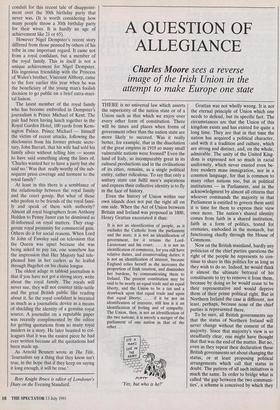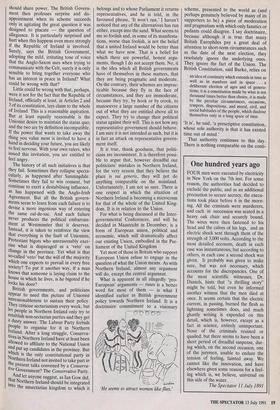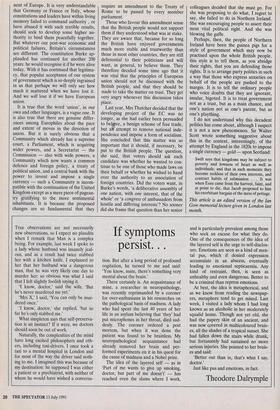A QUESTION OF ALLEGIANCE
Charles Moore sees a reverse
image of the Irish Union in the attempt to make Europe one state
THERE is no universal law which asserts the superiority of the nation state or of a Union such as that which we enjoy over every other form of constitution. There will be times and places when forms of government other than the nation state are more likely to succeed. Was it really better, for example, that in the dissolution of the great empires in 1919 so many small vulnerable nations were formed? Even the land of Italy, so incomparably great in its cultural productions and in the civilisations of its cities, remains, as a single political entity, rather ridiculous. To say that only a unitary state can fulfil men's aspirations and express their collective identity is to fly in the face of history.
Even the history of Union within our own islands does not put the right all on one side. When the Act of Union between Britain and Ireland was proposed in 1800, Henry Grattan excoriated it thus: It is not an identification of people, as it excludes the Catholic from the parliament and the state; it is not an identification of government, for it retains the Lord- Lieutenant and his court; . . . it is not an identification of commerce, for you still have relative duties, and countervailing duties; it is not an identification of interest, because England relies herself as she increases the proportion of Irish taxation, and diminishes her burdens, by communicating them to Ireland. The present constitution may be said to be nearly an equal trade and an equal liberty, and the Union to be a tax and a drawback upon that equal trade and upon that equal liberty; . . . if it be not an identification of interests, still less is it an identification of feeling and of sympathy. The Union, then, is not an identification of the two nations; it is merely a merger of the parliament of one nation in that of the other.. .
'Yes, but who is he?' Grattan was not wholly wrong. It is not the eternal principle of Union which one needs to defend, but its specific fact. The circumstances are that the Union of this kingdom exists and has existed for quite a long time. They are that in that time the nation has acquired a political character, and with it a tradition and culture, which are strong and distinct, and, on the whole, admirable. The unity of the United King- dom is expressed not so much in racial uniformity, which never existed even be- fore modern mass immigration, nor in a common language, for that is common to many other nations too, but in political institutions — in Parliament, and in the acknowledgment by almost all citizens that whoever commands the majority in that Parliament is entitled to govern them until it is time for them to express their view once more. The nation's shared identity comes from faith in a shared institution, faith in a form of politics, tested for centuries, embodied in the monarch, but functioning chiefly through the House of Commons.
Now on the British mainland, hardly any politician of the chief parties questions the right of the people he represents to con- tinue to share in this politics for as long as they wish to do so. Indeed, he would think it almost the ultimate betrayal of his constituents to try to remove it from them, because by doing so he would cease to be their representative and would deprive them of their prime political right. But in Northern Ireland the case is different, not least, perhaps, because none of the chief parties is represented there.
To be sure, all British governments say that the status of Northern Ireland will never change without the consent of the , majority. Since that majority's view is so steadfastly clear, one might have thought that that was the end of the matter. But no, even as they repeat their declaration these British governments set about changing the status, or at least proposing political arrangements which call that status in doubt. The pattern of all such initiatives is much the same. In order to bridge what is called 'the gap between the two communi- ties', a scheme is conceived by which they should share power. The British Govern- ment then professes surprise and dis- appointment when its scheme succeeds only in agitating the great question it was designed to placate — the question of allegiance. It is particularly surprised and hurt when this happens even more strongly if the Republic of Ireland is involved. Surely, says the British Government, adopting the mild, irritating tone of voice that the Anglo-Saxon uses when trying to communicate with the Celt, surely it is only sensible to bring together everyone who has an interest in peace in Ireland? What could be wrong with that?
Little could be wrong with that, perhaps, were it not for the fact that the Republic of Ireland, officially at least, in Articles 2 and 3 of its constitution, lays claim to the whole of Ireland. This is a reasonable aspiration. But at least equally reasonable is the Unionist desire to maintain the status quo; and the two are by definition incompatible. If the power that wants to take away the thing you value most is invited to have a hand in deciding your future, you are likely to feel nervous. With your own rulers, who issued this invitation, you are entitled to feel angry.
The history of all such initiatives is that they fail. Sometimes they collapse specta- cularly, as happened after Sunningdale. Sometimes they fail to win consent, but continue to exert a destabilising influence, as has happened with the Anglo-Irish Agreement. But all the British govern- ments seem to learn from each failure is to devise a more ingenious way of entering the same cul-de-sac. And each failure never produces the political embarrass- ment at Westminster that it deserves. Instead, it is taken to reinforce the view that everything is the fault of Unionists, Protestant bigots who unreasonably exer- cise what is disparaged as a 'veto' on change in the province. Yet what is that so-called 'veto' but the will of the majority which one expects to prevail in every free society? To put it another way, if a man knows that someone is laying claim to the house in which he lives, is he bigoted if he locks his door?
British governments, and politicians appear to need this picture of Unionist unreasonableness to sustain their policy. They criticise sectarianism every week, but let people in Northern Ireland only try to establish non-sectarian parties and they get a dusty answer. The Labour Party forbids People to organise for it in Northern Ir. eland. After a long struggle, Conserva- tives in Northern Ireland have at least been allowed to affiliate to the National Union and put up candidates in the province. But which is the only constitutional party in Northern Ireland not invited to take part in the present talks convened by a Conserva- tive Government? The Conservative Party. And let anyone suggest, as Ian Gow did, that Northern Ireland should be integrated tato the unsectarian kingdom to which it belongs and to whose Parliament it returns representatives, and he is told, in the favoured phrase, 'It won't run.' I haven't noticed that any of the alternatives has run either, except into the sand. What seems to me so foolish and, in some of its manifesta- tions, worse than foolish, is not the belief that a united Ireland would be better than what we have now. That is a belief for which there are powerful, honest argu- ments, though I do not accept them. No, it is the idea which all British governments have of themselves in these matters, that they are being pragmatic and moderate. On the contrary, their schemes are imprac- ticable because they fly in the face of circumstances, and they are immoderate, because they try, by hook or by crook, to manoeuvre a large number of the citizens out of what they are entitled above all to expect. They try to change their political status against their will. This is not how any representative government should behave. I am sure it is not intended as such, but it is in fact an attack on representative govern- ment itself.
It is true, thank goodness, that politi- cians are inconsistent. It is therefore possi- ble to argue that, however dreadful our politicians' mistakes in Northern Ireland, for the very reason that they believe the place is sui generic, they will pot do anything comparable on the mainland. Unfortunately, I am not so sure. There is one respect in which the situation of Northern Ireland is becoming a microcosm for that of the whole of the United King- dom. It is in relation to the Union.
For what is being discussed at the Inter- governmental Conferences, and will be decided in Maastricht in December, is a form of European union, political and economic, which will dramatically affect our existing Union, embodied in the Par- liament of the United Kingdom Yet most of those in Britain who support European Union refuse to engage in the question of what the Union means. As with Northern Ireland, almost any argument will do, except the central argument.
What is apparent in all allegedly 'pro- European' arguments — ruses is a better word for most of them — is what I identified earlier in British government policy towards Northern Ireland. It is a doctrinaire commitment to a visionary `He seems to attract women like flies.' scheme, presented to the world as (and perhaps genuinely believed by many of its supporters to be) a piece of moderation and pragmatism with which only fanatics or pedants could disagree. I say doctrinaire, because although it is true that many British Europhiles pay a great deal of attention to short-term circumstances such as the date of the next election, they resolutely ignore the underlying ones. They ignore the fact of the Union. The British Constitution, said Burke, relies on
an idea of continuity which extends in time as well as in numbers and in space . a deliberate election of ages and of genera- tions; it is a constitution made by what is ten thousand times better than choice, it is made by the peculiar circumstances, occasions, tempers, dispositions, and moral, civil, and social habitudes of the people, which disclose themselves only in a long space of time.
`It is', he said, 'a prescriptive constitution, whose sole authority is that it has existed time out of mind.'
That authority continues to this day. There is nothing comparable on the conti- nent of Europe. It is very understandable that Germany or France or Italy, whose constitutions and leaders have within living memory failed to command authority , or have abused it with such terrible results, should seek to develop some higher au- thority to bind them peacefully together. But whatever our post-war economic and political failures, Britain's circumstances are different. The constitution Burke ap- plauded has continued for another 200 years: he would recognise it if he were alive today. With it has continued that legitima- cy, that popular acceptance of our system of government which is so deeply ingrained in us that perhaps we will only see how much it mattered when we have lost it. And we will lose it if we have European union.
It is true that the word 'union', in our own and other languages, is a vague one. It is also true that there are genuine differ- ences among Europhiles about the pace and extent of moves in the direction of union. But it is surely obvious that a Community which already has a supreme court, a Parliament, which is acquiring wider powers, and a Secretariat — the Commission — also with wide powers, a Community which now wants a common defence and foreign policy, a treaty of political union, and a central bank with the power to invent and impose a single currency — such a Community is incom- patible with the continuation of the United Kingdom except as a mere piece of pagean- try gratifying to the more sentimental inhabitants. It is because the proposed changes are so fundamental that they require an amendment to the Treaty of Rome to be passed by every member parliament.
Those who favour this amendment sense that the British people would not support them if they understood what was at stake. They are aware that, because for so long the British have enjoyed governments much more stable and trustworthy than those in most other countries, they are still deferential to their politicians and will want, in general, to believe them. They therefore decided some time ago that it was vital that the principles of European union should not be discussed with the British people, and that they should be made to take the matter on trust. They get very angry whenever this discussion takes place.
Last year, Mrs Thatcher decided that the developing project of the EC was no longer, as she had earlier been persuaded to believe, a benign scheme of free trade, but ate attempt to remove national inde- pendence and impose a form of socialism. She concluded that this matter was so important that it should, if necessary, be put to the British people. The question, she said, that voters should ask each candidate was whether he wanted to con- tinue to be one of those who made laws on their behalf or whether he wished to hand over the authority to an association of foreign countries. Did the voters want, in Burke's words, 'a deliberative assembly of one nation, with one interest, that of the whole' or 'a congress of ambassadors from hostile and differing interests'? No sooner did she frame that question than her senior colleagues decided that she must go. For she was proposing to do what, I regret to say, she failed to do in Northern Ireland. She was encouraging people to assert their most vital political right. And she was blowing the gaffe.
Perhaps, then, the people of Northern Ireland have been the guinea pigs for a style of government which may now be practised upon the whole British people. this style is to tell them, as you abridge their rights, that you are defending those rights. It is to arrange party politics in such a way that those who express anxieties on behalf of the people are pushed to the margin. It is to tell the ordinary people who voice doubts that they are ignorant, insular, bigoted. It is to treat government not as a trust, but as a main chance, and one's nation not as one's parent, but as one's plaything.
I do not understand why this decadent politics has come about, although I suspect it is not a new phenomenon. Sir Walter Scott wrote something suggestive about this in the context, interestingly, of the attempt by England in the 1820s to impose a single currency — gold — upon Scotland:
Swift says that kingdoms may be subject to poverty and lowness of heart as well as individuals; and that in such moments they become reckless of their own interests, and contract habits of submission . . . It was when Esau came from the harvest, faint, and at point to die, that Jacob proposed to him his exorbitant bargain of the mess of pottage.
This article is an edited version of the Ian Gow memorial lecture given in London last month.




















































 Previous page
Previous page